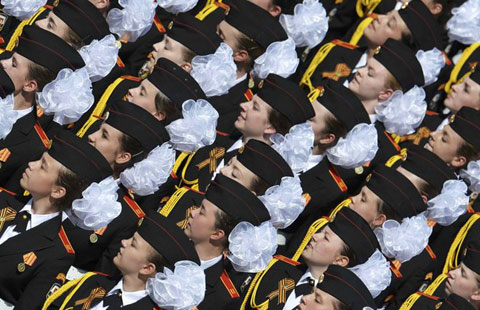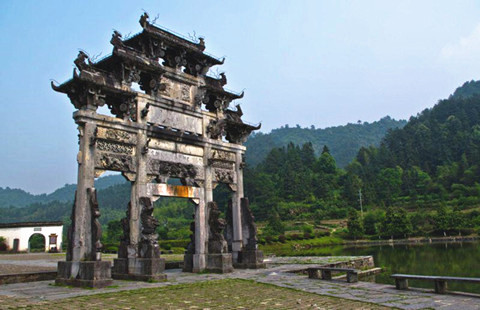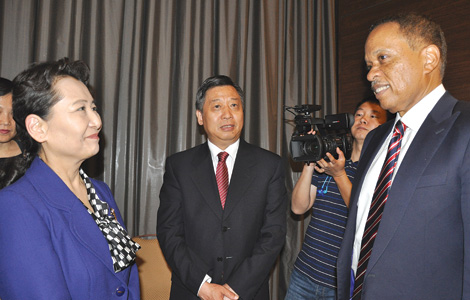Japan 'should apologize to other Asian countries'
Updated: 2015-05-10 20:20
By CAI HONG in Tokyo(chinadaily.com.cn)
|
||||||||
Q: The Abe administration wants a greater presence for Japan on the world stage. What role do you expect Japan to play?
A: Japan needs to provide US military bases under the Japan-US Security Treaty. In return, the US will protect Japan from attacks. Japan will assume more responsibilities on the military front if the security treaty expands the scope of activities. This goes against Japan's pacifist Constitution. If the country always maps out its future strategies based on assumptions that it would be attacked or invaded, it had better think about how to prevent the attacks and invasions. The latter should be Japan's priority.
Q: Then, what should be done to create a peaceful environment?
A: If Japan continues to uphold pacifism — sending no soldiers abroad — which country will invade it? There is the hype around the Diaoyu Islands. Will China invade Japan over these islands? It is scarcely thinkable. If Japan stubbornly assumes foreign invasions and responds, other countries will adjust their policies accordingly. As a result, the situation will be more volatile. ... If Japan sticks to its defense-only policy and sends a signal that it does not need war, other countries will not pose a threat to it. Hence, keeping the pacifist constitution intact is of paramount importance.
Q: Is Article 9 of Japan's Constitution (which forbids making war as a means of resolving disputs) behind the times?
A: This territorial dispute has been mentioned frequently in the Japanese government's public relations campaign. It has led to a sense of crisis among people in Japan. As a result, they are beginning to think about whether the Constitution should be rewritten.
China has a vast territory with a long border, which it needs to defend. Consequently, China has to have a kind of military power for self-defense rather than war.
The sense of crisis among people in Japan has helped the Japanese government solicit a lot of support for constitutional amendment. This is what we need to campaign against.
Q: This will be a painstaking fight, won't it?
A: If there was a permanent sense of crisis, (China and Japan) would be increasingly on the alert, ratchet up the tension and go for war. No one would win. The Abe administration wants to rewrite the Constitution by fueling anxiety among the Japanese people. At this point, I am against Abe. It is important to reduce the sense of crisis and antagonism in the two countries. If possible, I want to visit China to talk about this issue.
Q: The Abe administration has moved Japan closer to the United States. What do you think of Japan-US relations?
A: Japan and the US have developed their relationship based on mutual cooperation since Japan was defeated 70 years ago. Things have changed. Japan is a sovereign nation different from the one occupied (by US-led Allied troops). Japan needs to have its voice heard in these ties, and the US needs to listen more carefully to voices from Japan. Bilateral relations need to be improved in this regard.
Q: Tokyo, in one way or another, dances to Washington's tune. Take the China-led Asian Infrastructure Investment Bank. Can we see that Japan is taking a realistic approach by compromising equality for military protection from the US?
A: Japan needs to change its relations with the US radically. In terms of the AIIB, the two countries, which are not currently joining the bank under the pretext of boycotting China's "oligarchical-style of control", will join sooner or later. Asia's development, which has made headway, needs a lot of funding. So the AIIB is a good idea.
- Response to Japan PM's speech, visit
- ROK's painful history must not be repeated by Abe's Japan
- 'Chinanomics' could hold key to Japan's economy recovery
- Japan's ex-PM Murayama criticizes Abe's statement on apology
- Lesson from Japan: Don't let deflation go out of control
- 'Repeated apologies need to be made by Japan'
- Sixth policeman dies after gun battle in Macedonia
- Houthis, Yemeni army welcome Saudi proposal for 5-day truce
- Japan 'should apologize to other Asian countries'
- Five facts to know about Russia's V-Day parades
- Egypt court sentences Mubarak, sons to three years in jail
- DPRK test-fires three short-range missiles

 Super fit mother works out with her three children
Super fit mother works out with her three children
 Fireworks explode across Russia to celebrate Victory Day
Fireworks explode across Russia to celebrate Victory Day
 Mother's Day marked across China
Mother's Day marked across China Prince Harry receives Maori greetings in New Zealand
Prince Harry receives Maori greetings in New Zealand
 In photos: Russia holds V-Day parade
In photos: Russia holds V-Day parade
 Huizhou, home to Huizhou Culture
Huizhou, home to Huizhou Culture
 Actress poses with son and daughter for Mother's Day
Actress poses with son and daughter for Mother's Day
 Media players discuss bilateral role
Media players discuss bilateral role
Most Viewed
Editor's Picks

|

|

|

|

|

|
Today's Top News
Chinese president arrives in Belarus for state visit
Wang Qishan highlights Party discipline in anti-corruption effort
Summer Palace replica opens to public amid controversy
Plane skids off runway in SE China
Chinese investors get tips on investing in US
Media's role called crucial
Movie mogul buys Picasso at NY auction for nearly $30m
Memory of Flying Tigers honored
US Weekly

|

|







